
Christ has no hands; he has only our hands
to do his work today.
He has no feet; he has only our feet
to lead humanity in his pathway.
Christ has no lips; he has only our lips
to speak of himself to human beings.
He has no help; he has only our help
to bring men and women into his fold.
We are the one and only Bible that people still read.
We are the last message of God, written in words and deeds.
Anonymous
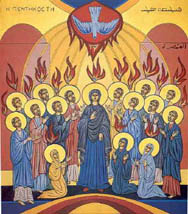
PENTECOST:
“COME HOLY SPIRIT!â€

Jesus Christ rose from the dead, ascended up to heaven, and sent with the Father, the Holy Spirit to the disciples (Jn 20:22 and 16:7-14).With the Solemnity of Pentecost, Christians close the Easter season.
The Acts of the Apostles (2:1-11) narrates the coming of the Holy Spirit upon the apostles: the strong wind, the tongues of fire, the miraculous preaching of the apostles. The Holy Spirit continues coming to us. The beautiful Sequence before the gospel of the Solemnity of Pentecost moves us to pray: Come Holy Spirit!
- MEDITATION
An old priest is teaching religion to high school students. He asked them: “Who is the Blessed Trinity?†A boy at the back answers very softly: “Father, Son and Holy Spirit.†The priest, who is a bit deaf, tells him: “I cannot understand.†The boy: “Father, you are not supposed to; it is a mystery.†The mystery of the Most Holy Trinity is the central mystery of our faith: we believe in One and Triune God: one God and Three persons; unity in diversity; “one love and three lovers.â€
The Holy Spirit is the Third Person of the Blessed Trinity. He is the love of the Father and the Son. The Father (with the Son and the Holy Spirit) is the creator; the Son (with the Father and the Holy Spirit) is the Redeemer, and the Holy Spirit (with the Father and the Son) is the sanctifier who helps us remember what Jesus taught and continues teaching us. The Holy Spirit is “like the perfume of the Two Divine persons, the breath of the Father and the Son, their smile, their love, their beauty, their kiss†(J. Cristo Rey GarcÃa Paredes).
The Holy Spirit, or the love of the Father and the Son, invites us to love. The One and Triune God is love, and with the gift of this love urges us to love – to love Him, to love all neighbors, principally the closest and the poorest neighbors. Jesus said: “Anyone who loves me will be true to my word, and my Father will love him; we will come to him and make our dwelling place with him†(Jn 14:23)); “In this they will know that you are my disciples, in your love for one another†(Jn 13:35); “I was hungry and you gave me food…; what you do to the least of my brothers and sisters, you do it to me†(Mt 25:35 and 25:40).
The Holy Spirit, the sanctifier invites us to be holy and gives us the grace of Christ to be holy, the grace which makes us sharers in the very nature of God – and his children. All God’s children are called to holiness. Is it hard to be holy? Not that hard! “Just one step beyond mediocrity and you are a saint†(Leon Bloy). To be holy with God’s grace and love is possible: we need determined determination. We have to really want to be holy: “to want it, to want it, to want it†(St Thomas Aquinas);
“I will, I want, with God’s blessings, be holy†(Blessed Mother Theresa of Calcutta). After all, to be holy means really to do God’s will, that is, to fulfill the commandments which are centered on love.
The Holy Spirit helps us to pray, that is, to feel the presence of God in our lives, to raise our hearts to God, to ask for God’s love: to love Him, others and ourselves! Saint Teresa of Avila says that to pray consists not in talking much, nor in thinking much, but in loving much.
- OUR RESPONSE
A bishop is showing a Church to a group of Japanese tourists. The central altar is presided by a painting of the Blessed Trinity. A Japanese tourist pointing to the painting asks the bishop: “Who is that Honorable Bird?†The Honorable Bird is the Dove, which represents the Holy Spirit.
The Holy Spirit is, someone explains, wind, tongue and fire. He is the wind that takes us to the whole world to announce the Good News of Christ. He is the tongue we need to be able to preach the truth. He is the fire of love required to burn our selfishness. Saint Augustine said, after his conversion: “O Love that is my God set me afire.â€
The Holy Spirit invites us constantly to unity: one faith, one Lord, one baptism. He invites us to fraternity: in Christ, we are brothers and sisters of one another.
Life is a journey to God’s home. In our journey of life, we have to walk according to the Holy Spirit, who urges us to be holy: “This is the will of God, your sanctification†(1Thes 4:3); “Be perfect as your Father is perfect†(Mt 5:48). We have to journey – like the first disciples and true disciples thereafter – proclaiming and witnessing the Good News of Jesus Christ with hope, joy and courage.
We pray: “Come Holy Spirit, come!â€
Fr. Fausto Gómez Berlana, O. P.
St Dominic’s Priory
Macau, June 2011.

Creator of all things
true source of light and wisdom,
lofty origin of all being,
graciously let a ray of your brilliance
penetrate into the darkness of my understanding
and take from me the double darkness
in which I have been born,
an obscurity of both sin and ignorance.
Give me a sharp sense of understanding,
a retentive memory,
and the ability to grasp thing
correctly and fundamentally.
Grant me the talent of being exact in my explanations,
and the ability to express myself
with thoroughness and charm.
Point out the beginning, direct the progress,
and help in the completion;
through Christ our Lord.
Amen
St. Thomas Aquinas
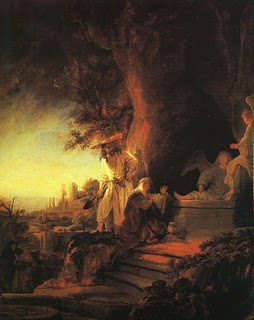
MEANING OF EASTER
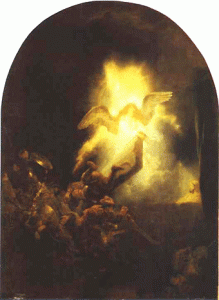 As I begin to mediate on the meaning of Easter for me, I remember a story. A few years ago, as I was walking one afternoon in the campus of the University of Santo Tomas, Manila, a young man approached me and asked: “Father, what is the real meaning of Easter?†After conversing with the young man I went home and wrote a few thoughts on Easter. Let me share with you those thoughts and others that occurred to me on the journey of life.
As I begin to mediate on the meaning of Easter for me, I remember a story. A few years ago, as I was walking one afternoon in the campus of the University of Santo Tomas, Manila, a young man approached me and asked: “Father, what is the real meaning of Easter?†After conversing with the young man I went home and wrote a few thoughts on Easter. Let me share with you those thoughts and others that occurred to me on the journey of life.
Christians through centuries, particularly the first disciples of Jesus, have proclaimed in words and deeds: We are Easter people! For us Christians, the resurrection of Christ is the central mystery of our faith. Saint Paul writes: “In the first place I taught you what I had been taught myself, namely that Christ died for our sins, in accordance with the scriptures; that he was buried, and that he was raised to life on the third day, in accordance with the scriptures†(I Cor 15:3-4).
To be a Christian yesterday, today and always means to be able to say with God’s grace – like Mary Magdalene, like the apostles – I have seen the Lord! To see the Lord in life implies to experience his presence as Crucified and Risen Lord, to be transformed by him, to be seduced by his life and mission. How may we know that indeed we have seen the Lord Jesus?
How did the first Christian communities show that they had experienced Christ’s transforming presence? Their answer: “They remained faithful to the teaching of the apostles, to fraternity, to the breaking of the bread, and to prayer… They shared their food gladly and generously, praised God and were looked up to by everyone†(Acts, 2:42, 46-47).
Is the Lord the Risen Lord for us? If we have encountered Jesus in our life, then he is raised from the dead. Where may we encounter the Risen Lord? We may encounter the Risen Lord in the praying and fraternal community, in the Church, which is the Mystical Body of Christ and a Community of Disciples: “Where two or three are gathered in my name, there am I in their midst†(Mt 18: 19-20). We recall that the apostle Thomas did not experience the presence of the Risen Lord when he was absent from the apostolic community.
We may encounter the Risen Lord in the Sacraments of the Church: in Baptism (the catechumens baptized on Easter Vigil experienced Jesus raised from the dead), in Penance, and above all in the Holy Eucharist: “This is my body,†Jesus said, “This is my blood†(Mt 26:28-28). Furthermore, we may experience the Risen Lord in the Word of God, the Sacred Scriptures, particularly when proclaimed in the Church. We remember the two disciples of Emmaus, who after recognizing the Lord in the breaking of the bread said to one another: “Were not our hearts burning inside us as he talked to us on the road and explained the Scriptures to us? “ (Lk 24:32).
We may encounter Christ the Lord in our mission, in preaching and witnessing the Good News. This is the great resurrection command from the Risen Lord: “Go, therefore, and make disciples of all nations… And know that I am with you always, until the end of the world†(Mt 28:19-20). We may also feel the presence of Jesus in our lives if we love the little ones, that is, the poor, the sick, and the abandoned on the roads of life. These words of Jesus resound in our hearts in a special way through Easter: “What you do to the least of my brothers, you do it to me†(Mt 25:40). As it has been often said and repeated: Jesus is personally present (“I was hungry and you gave me foodâ€) in the “poor†and in those who are close to the poor.
How may we experience Christ’s resurrection, Easter today? We may experience him by turning away from sin, which is darkness and by practicing virtue, which is light. Easter is light: the light of Christ, Jesus the Easter Candle. True Easter, according to Saint Athanasius, is abstention from sin, practice of virtue and the passage from death to life. But, how may one know that he or she has passed from death to life? We know, St. John tells us, “we know that we have passed out of death and into light, and of this we can be sure, because we love our brothersâ€(I Jn 3:14).
One fact from the Easter narratives that moves me deeply is the courageous, hopeful and joyful love of the apostles and the first Christians. These proclaimed the Word, focused on the death and resurrection of Jesus, in an incredibly bold manner. They were outrageously joyful – even in suffering and particularly in martyrdom. At times in our life, it is hard to be joyful. But we know that, as witnesses of the resurrection of Christ, our life ought to be permeated essentially by joy. I remember this remark by one of my favorite authors, Martin Descalzo: “The two travelers to Emmaus had a reason to be sad, for they believed that Jesus was dead; the bad thing is that some of us continue to be sad even believing that He lives.â€
Saint Augustine narrates to us a beautiful and inspiring story. In the first centuries, through the Easter Vigil night, some unbelievers (“the pagansâ€) were not able to sleep much – haunted it would seem by the songs of the Christians inside their home or community. At early morning, these unbelievers rushed to the Christian places of worship and position themselves near the doors to be able to watch how the Christians came out after the celebration of the Eucharist of the Resurrection through the whole night long. When they saw the joyful, transfigured faces of the Christians, many of them were converted to Jesus – to the Risen Lord. How are the faces of Christians today – our faces? “The old has passed away, behold the new has come†(II Cor 5:17).
Are we Easter People? Indeed, we are: We Christians believe strongly in the resurrection of Jesus the Lord, which is the guarantee of our own resurrection (I Cor 15:20-23). That is why we are Easter People and we – sinners all – try hard to behave as witnesses of his resurrection – of his love. We are Easter People and Alleluia is our song! May those around us notice that we are Easter People by the way we treat them with kindness and compassion. Dear co-pilgrim by the journey of life… Happy Easter! (FGB)

EASTER VIGIL: CHRIST, OUR PASCHAL LIGHT
“Christ is our light. THanks by to God”
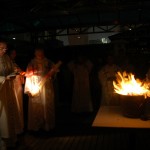
Easter Vigil 1
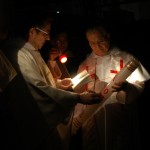
Easter Vigil 2
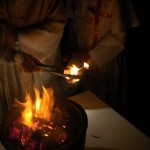
Easter Vigil 3
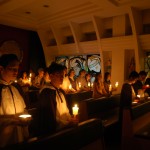
Easter Vigil 4
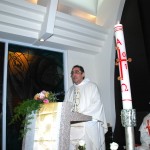
Easter Vigil 5

Easter Vigil 6
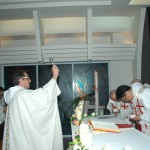
Easter Vigil 7

Easter Vigil 8
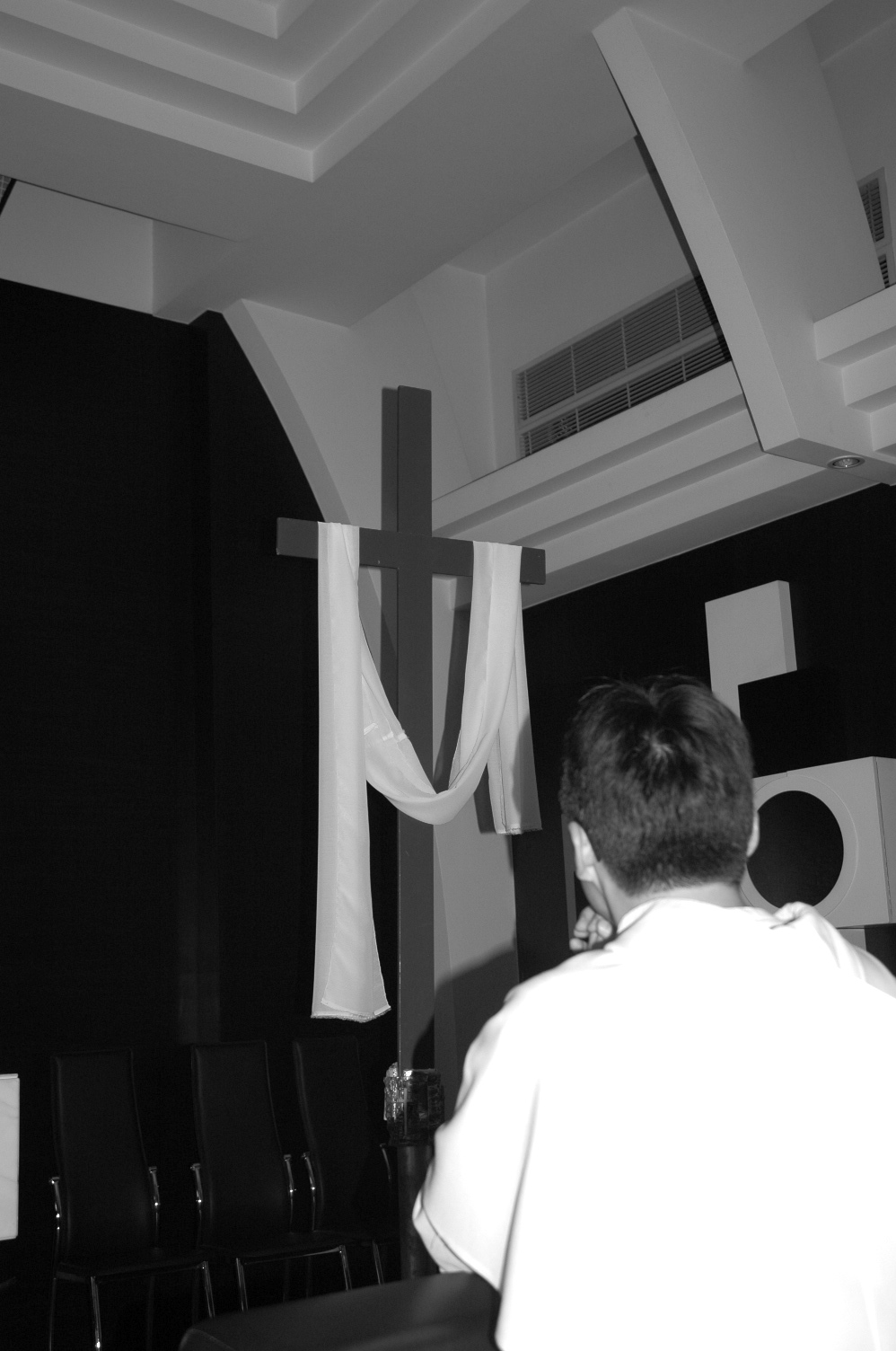
GOOD FRIDAY: THE LORD’S PASSION
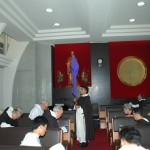 INTRODUCTION
INTRODUCTION
It is Good Friday! Today’s austere liturgy comprises three parts.
First part: Liturgy of the Word (“to revive our faith in the power of the Lord’s deathâ€), and General Intercessions (to pray for all).
Second part: Veneration of the Cross (source of our redemption).
Third part: Holy Communion (according to ancient tradition, Mass is not celebrated today and tomorrow). As we begin, we place ourselves actually before Jesus on the Cross.
MEDITATION (on the Passion of Our Lord Jesus Christ)
What may anyone – much less me -, what can anyone say after proclaiming – reliving – the Passion of our Lord Jesus Christ?
I feel urged to add a footnote in three basic questions:
- We contemplate Jesus, the innocent one, the holy one. We look at him: so “gentle, humble and patient†(St. Basil). So serene! First question: Why did Christ die on the Cross?
Two reasons are clearly given by our faith. Jesus suffered and died on the Cross to show us the great love of God for us: “God so loved the world that He gave his only begotten Son.†Moreover, Jesus died on the cross to show us the evilness of sin: Sin is darkness, night, and unhappiness: a betrayal of God’s love and of the blood of Christ shed for us.
- 2. We see the terrible sufferings pervading our world: natural disasters, wars, violence, injustice, the suffering of the innocent! Second twofold question: Why there is so much suffering in our world? Why do innocent children suffer?
The mystery of evil continues! And the mystery of a good and omnipotent God! We know that God loves us, and that the only answer we have to those piercing questions is Jesus on the cross – Jesus, the Son of God and the Son of Mary, our brother! Facing those sufferings, we are asked by our humanity and our faith to help others carry their cross not with sermons, but with compassion. One of the gravest things one can do in life is to make others suffer (A. Camus).
- 3. As we fix our eyes on Jesus on the Cross, we also think of our own cross: you know that you will be saved on your cross, and I know that I will be saved on mine! Third multiple question: Dear Lord, why this cross? Why for me? Why now?
Jesus answers from the Cross: “If anyone wants to be my disciple let him deny himself, take up his cross and follow me.†Jesus, our savior and friend, adds: “My yoke is light,†“come to me all who are burdened and I will give you rest.†No wonder, for the saints, the truly happy ones, when the cross comes, it is the Lord who comes!
As we venerate the Cross of Chris, we make an act of faith (“Adoro te devote, latens deitas, in cruce latebat sola deitasâ€Â – “I adore You, hidden God, in the Cross only the divinity was hidden,†while in the Eucharist, also the humanity of Christ is hidden). When we kiss the Cross of Christ, we kiss Christ on the Cross. As we kiss Christ on the Cross today we also kiss our brothers and sisters who are crucified like Christ. Where were you, where was I, when they crucified our Lord? Where are we when others are crucified today?
Good Friday is part of our life. We cannot jump from Palm Sunday and its hosannas, to Easter Sunday and its Alleluias! Easter Sunday is only possible after Good Friday! With Mother Mary, Our Lady of Hope, we thank you, Lord, for your wounds, for your death – for your love! We are sorry Lord, for our sins, for the sufferings we cause to others, for our lack of compassion. Above all, God the Father, God the Son and God the Holy Spirit; above all, many, many, many thanks! To you, dear God One and Triune, be honor and glory and power forever and ever. Amen.
Fr. Fausto Gomez Berlana, O. P,

















